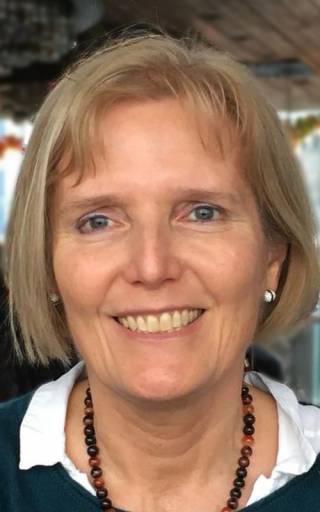University of Cambridge and Cambridge University Hospitals NHS Foundation Trust
ICGNMD investigators, co-investigators, fellows and key staff:
Co-Director, Cambridge; Clinical Genetics Co-Lead: Professor Patrick Chinnery

Patrick Chinnery is Co-Director of the ICGNMD in Cambridge and co-supervisor of a UK fellow, Katherine Schon.
Patrick Chinnery is Professor of Neurology at the University of Cambridge, head of the Department of Clinical Neurosciences and an Honorary Consultant Neurologist at Cambridge University Hospitals NHS Trust. He was elected a Fellow of the Academy of Medical Sciences in 2009 and was appointed as MRC Clinical Director in 2019.
Patrick's research laboratory, based at the MRC Mitochondrial Biology Unit, is primarily focussed on determining the major nuclear and mitochondrial genetic factors that modulate the clinical expression of mitochondrial disorders. His research involves defining the sub-cellular mechanism responsible for the mtDNA genetic bottleneck, and characterising novel mitochondrial and nuclear gene defects responsible for mitochondrial disorders and their variable phenotype in patients.
Co-investigator, Fellows Supervision Co-Lead: Professor Rita Horvath

Rita Horvath is organising the educational part of ICGNMD in Cambridge. The focus of her research is mitochondrial disease and CMT. She is participating in clinical case discussions with the clinicians and clinical fellows in Turkey. She is co-supervisor of a Turkish clinical fellow Ipek Kalafatcilar in Izmir and a UK fellow, Dr. Katherine Schoen in Cambridge.
Rita Horvath is a clinical academic and Honorary Consultant in Neurology and completed her PhD on mitochondrial disease. She established her research group to study mitochondrial translation deficiencies and developed a new service for patients with inherited peripheral neuropathies (Charcot-Marie-Tooth disease, CMT). The focus of her research is to identify key molecular disease mechanisms with the aim of developing treatments for patients with rare inherited neurological conditions, such as mitochondrial disease and CMT.
ICGNMD Clinical Fellow:
Dr Katherine Schon
Co-investigators:
Dr Jelle van den Ameele
Dr May Yung Tiet
Key staff:
Dr Fei Gao
Heather Biggs
Emma Harrison
Chloe Seikus
- Clinical neuromuscular expertise, patients and geographical region:
Cambridge University Hospitals NHS Foundation Trust (CUH NHS FT) is a large teaching hospital that serves the whole of East Anglia and hosts several national clinical services. We look after patients with suspected neurogenetic disorders including mitochondrial diseases, accepting referrals from around East Anglia and further afield. We have access to diagnostic tools including genetic and genomic testing through the East Midlands and East of England NHS Genomic Laboratory Hub which is based at CUH, neurophysiology, muscle biopsy and MRI. We work closely with colleagues in paediatric neurology, clinical genetics, ophthalmology, radiology, neurophysiology and histopathology as well as local paediatricians, physiotherapists and Neuromuscular Care Advisors. Paediatric neurologists and clinical geneticists based at CUH provide outreach clinics in the surrounding District General Hospitals. The Department of Clinical Neurosciences at the University of Cambridge is embedded within CUH, which allows our research to stem from problems encountered in the clinic, and to directly address the needs of patients and families. The Neuromuscular Disease Service at Addenbrooke’s Hospital was designated as a Centre of Clinical and Research Excellence by Muscular Dystrophy UK.
- Genetics and preclinical science expertise and facilities:
The East Midlands and East of England NHS Genomic Laboratory Hub provides genetic testing for patients with neuromuscular disorders (NMD) via next generation sequencing panels, whole exome and whole genome sequencing. Genetic tests carried out by the EMEE NHS Genomic Laboratory Hub will be conducted in line with the new and standardised National Genomic Test Directory. For unwell neonates and children, there is access to rapid turnover (10 days) trio whole exome sequencing. The rapid identification of the molecular cause of diseases, and expertise in genetic counselling enable a fast diagnosis and appropriate explanation for patients. Many patients also take part in large genetics research projects such as the 100,000 Genomes Project and National Genome Library.
Prof Chinnery’s research laboratory is based in the MRC Mitochondrial Biology Unit and Dr Horvath’s research laboratory is in the John van Geest Centre for Brain Repair. Both groups aim to determine the major nuclear and mitochondrial genetic factors that modulate the clinical expression of mitochondrial disorders, thus explaining the tissue specific phenotypes, and also to develop new treatments for mitochondrial disorders. The groups have expertise in measuring mtDNA copy number and heteroplasmy level, sequencing technologies (including whole exome and whole genome sequencing, studying somatic mutations and long read sequencing), the use of a multi-omics approach (transcriptomics, proteomics and metabolomics), and single-cell ‘omics. Both groups use model organisms (mouse and zebrafish), patient derived cell lines and induced pluripotent stem cells. Bioinformatics is also a strong focus using data from collaborative projects such as the 100,000 Genomes Project and the NIHR BioResource. Professor Chinnery is particularly interested in the mtDNA genetic bottleneck during female germ cell development and Dr Horvath has a special interest in disorders of intramitochondrial protein synthesis.
- Current research programmes:
The Cambridge Clinical Mitochondrial Research Group is interested in the genetic basis of neurological disorders, particularly mitochondrial diseases (including mitochondrial eye diseases), and other rare inherited neurological conditions, such as Charcot Marie Tooth Disease and spastic ataxias.
Our research programme aims to:
study the mechanisms of mitochondrial and neurodegenerative diseases in patients and model systems, to understand why specific cell types are so vulnerable in mitochondrial diseases and how cells and tissues respond to mitochondrial dysfunction. determine the major nuclear and mitochondrial genetic factors that modulate the clinical expression of mitochondrial disorders, thus explaining the disease mechanisms and variable phenotype. study the natural history of mitochondrial and neurodegenerative diseases, and develop new and effective treatments for this group of patients through investigator-led experimental medicine studies, novel gene therapy approaches, and clinical trials in partnership with the pharmaceutical industry. provide novel insight for other conditions where mitochondrial dysfunction plays a role too, including diabetes and cancer.
- Top five publications from the past five years:
Metabolic shift underlies recovery in reversible infantile respiratory chain deficiency.
Hathazi D, Griffin H, Jennings MJ, Giunta M, Powell C, Pearce SF, Munro B, Wei W, Boczonadi V, Poulton J, Pyle A, Calabrese C, Gomez-Duran A, Schara U, Pitceathly RDS, Hanna MG, Joost K, Cotta A, Paim JF, Navarro MM, Duff J, Mattman A, Chapman K, Servidei S, Della Marina A, Uusimaa J, Roos A, Mootha V, Hirano M, Tulinius M, Giri M, Hoffmann EP, Lochmüller H, DiMauro S, Minczuk M, Chinnery PF, Müller JS, Horvath R.EMBO J. 2020 Dec 1;39(23):e105364. doi: 10.15252/embj.2020105364. Epub 2020 Oct 31.PMID: 33128823
Metabolic effects of bezafibrate in mitochondrial disease.
Steele H, Gomez-Duran A, Pyle A, Hopton S, Newman J, Stefanetti RJ, Charman SJ, Parikh JD, He L, Viscomi C, Jakovljevic DG, Hollingsworth KG, Robinson AJ, Taylor RW, Bottolo L, Horvath R, Chinnery PF.EMBO Mol Med. 2020 Mar 6;12(3):e11589. doi: 10.15252/emmm.201911589. Epub 2020 Feb 28.PMID: 32107855
Nuclear-mitochondrial DNA segments resemble paternally inherited mitochondrial DNA in humans.
Wei W, Pagnamenta AT, Gleadall N, Sanchis-Juan A, Stephens J, Broxholme J, Tuna S, Odhams CA; Genomics England Research Consortium; NIHR BioResource, Fratter C, Turro E, Caulfield MJ, Taylor JC, Rahman S, Chinnery PF.Nat Commun. 2020 Apr 8;11(1):1740. doi: 10.1038/s41467-020-15336-3.PMID: 32269217
Germline selection shapes human mitochondrial DNA diversity.
Wei W, Tuna S, Keogh MJ, Smith KR, Aitman TJ, Beales PL, Bennett DL, Gale DP, Bitner-Glindzicz MAK, Black GC, Brennan P, Elliott P, Flinter FA, Floto RA, Houlden H, Irving M, Koziell A, Maher ER, Markus HS, Morrell NW, Newman WG, Roberts I, Sayer JA, Smith KGC, Taylor JC, Watkins H, Webster AR, Wilkie AOM, Williamson C; NIHR BioResource–Rare Diseases; 100,000 Genomes Project–Rare Diseases Pilot, Ashford S, Penkett CJ, Stirrups KE, Rendon A, Ouwehand WH, Bradley JR, Raymond FL, Caulfield M, Turro E, Chinnery PF.Science. 2019 May 24;364(6442):eaau6520. doi: 10.1126/science.aau6520. Epub 2019 May 23.PMID: 31123110
First-line genomic diagnosis of mitochondrial disorders.
Raymond FL, Horvath R, Chinnery PF.Nat Rev Genet. 2018 Jul;19(7):399-400. doi: 10.1038/s41576-018-0022-1.PMID: 29789687
- How the international centre may benefit research and clinical programmes:
We are keen to strengthen existing links and build new collaborative research relationships which will also encourage future collaboration. The cross-disciplinary interaction between clinicians, basic scientists, bioinformaticians, statisticians and international teams will provide very valuable training for our ICGNMD clinical fellow and other team members. High quality publications resulting from collaborative research projects will also highlight the expertise available here and benefit the Cambridge Biomedical Research Centre as a whole.
 Close
Close

